Great discussions on the suspicious nature of society with data experts at the BankenForen Conference IT- & Cybersecurity in the financial industry
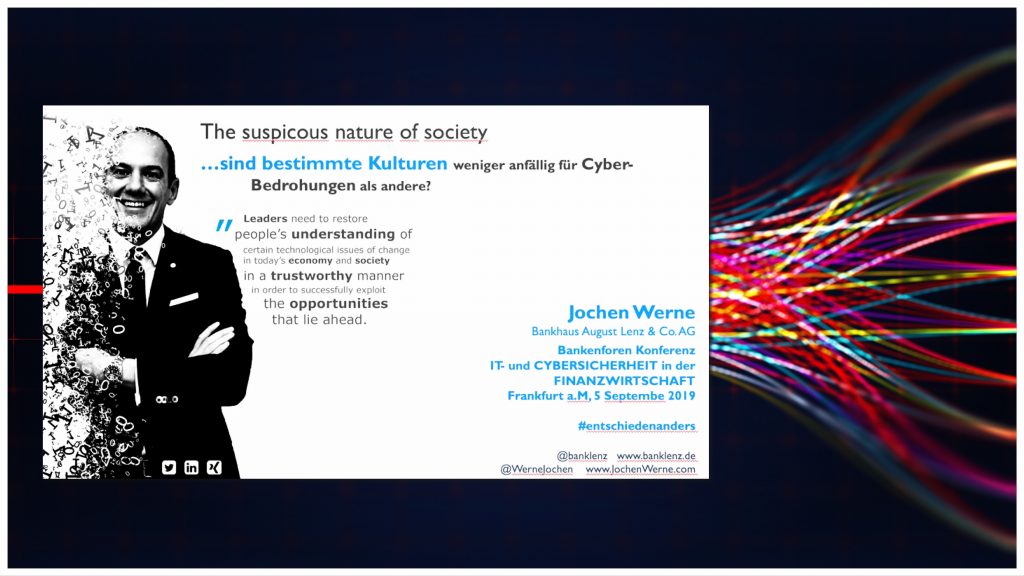
Details HERE
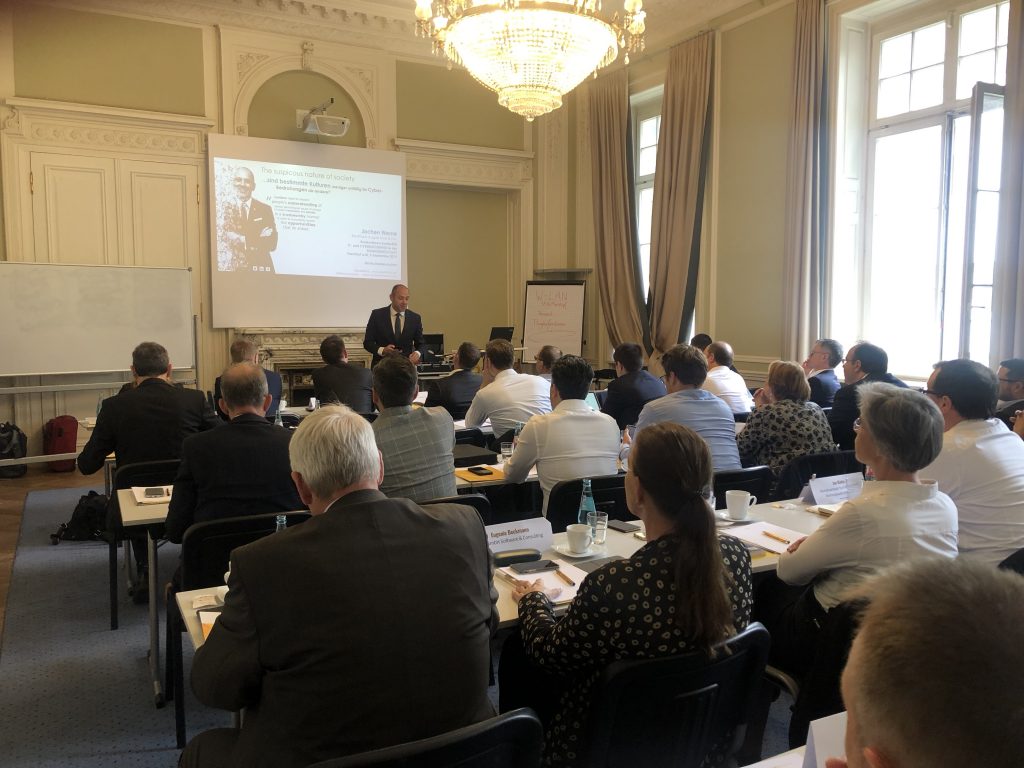

Great discussions on the suspicious nature of society with data experts at the BankenForen Conference IT- & Cybersecurity in the financial industry

Details HERE

Author: Jochen Werne
First published in German at LinkedIn Pulse on July 20, 2019. Please find article and sources in this link. Publication in English language pleas find below
Fyodor Mikhailovich Dostoyevsky, one of the most important writers of the 19th century, impressively describes in his works the great existential and spiritual conflicts in which mankind was caught at the dawn of modernity. Not only his observations during the turbulent times of the upheaval of the Russian Empire in the 19th century, but also his personal experiences are an essential part of his work.

At the age of 28 and at the beginning of a promising career as a writer, Dostoevsky was sentenced to four years in a Siberian prison camp. The reason for this was his participation in meetings of the Petraschwezen, an intellectual circle that spoke out against tsarist despotism and serfdom. In his novel, “The House of the Dead”, which also describes Dostoyevsky’s own experiences in Siberian captivity, he formulates the sentence that was later much quoted: “Money is coined liberty”. The sentence describes the vital relevance of the possibility of a free exchange of goods in an unfree environment – and this through coined cash money.
More than 150 years have passed since the first publication of the work. Europe needed to go through the age of Enlightenment, the experiences of two world wars and a long cold war to become a peaceful and very liberal place for its citizens. A place which is putting the dignity and freedom of the individual first.
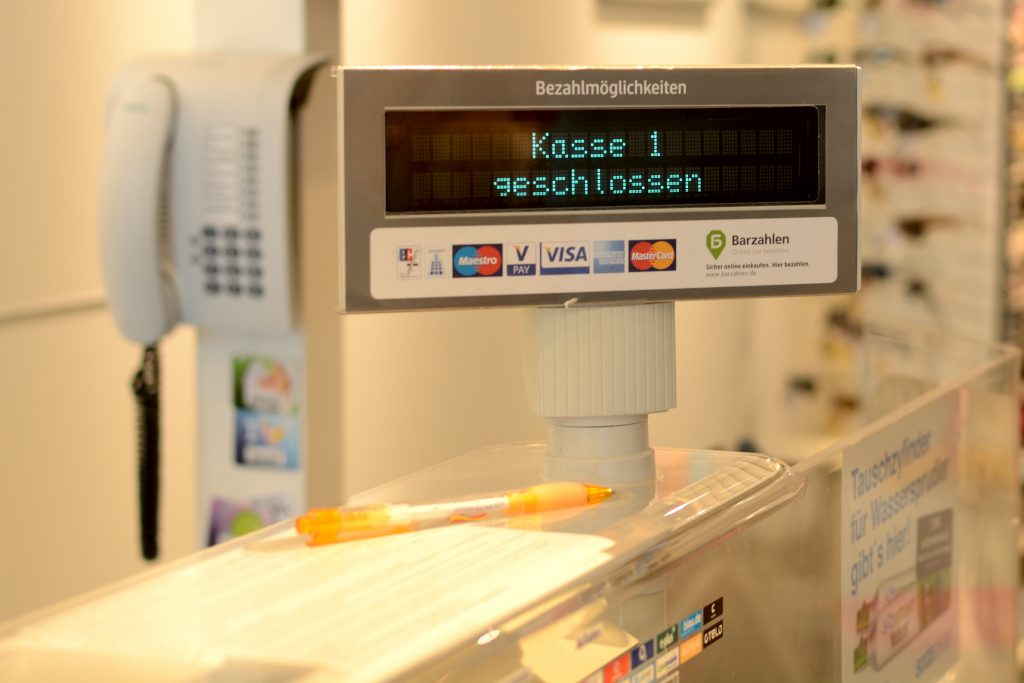
The freedom in our payment options has also multiplied thanks to technological progress. It is part of our everydays life to pay the morning croissant at the bakery, the new monthly ticket for the subway or even the use of public toilets – even without cash. Technological progress, the smartphone revolution and also our user behaviour made this evolution in payments possible. “Digital payments” have become part of our progressive society. However, the aspect of not having money physically tangible sometimes entails interesting and also unwanted aspects.
Like Dostoevsky, we also live in a time of extreme social, economic and political upheaval. An age in which exponential technology developments, industries and business models are changing radically and countries competing for dominance in areas such as artificial intelligence. It is a time when transformation is the new normality and an agile corporate culture is the key to success. In these times, for many it became clear that, “Everything that can be digitized will be digitized.” And thus the question inevitably arises whether this also applies to the first “Instant Payment” solution humans invented, one of the earliest and most sustainable achievements of civilization – cash.

If we look at Germany, cash is still one of the most popular payment methods and – culturally speaking – will probably remain for quite some time to come. According to a survey by the Bundesbank, 88 percent of German citizens continue to regard cash as their preferred means of payment. This cultural imprint can certainly also be traced back to modern history and the personal experiences of the Germans with their money. Beginning with the traumatic experience of hyperinflation during the Great Depression of 1923 and the resulting deep-rooted German understanding of the importance of a central bank independent from politics.
A painful experience, which states even today – like Venezuela – live through again and again and whose causes are often identical. In Reinhard and Rogoff’s bestseller book “This time is different”, this phenomenon is brilliantly explained using an analysis of 800 years of international economic history.
The positive image of (cash) money in Germany was impressively advanced after the end of the 2nd World War. From the currency reform of 1948 and the beginning of the economic miracle with 40 D-Mark, which every German was allowed to hold physically in his hands, to the 100 D-Mark welcome money at the reunification in 1989. These personal experiences paired with a consistently brillant independent work by the German Bundesbank – which always gave the population the feeling of having a strong, stable and secure own currency – are all German experiences, which were literally “obvious” and shaped the cultural reference of the country and its citizens.

The current freedom of our payment options is certainly good, as long as we consumers are free to decide which means of payment we pay with. Discussions about a possible restriction of citizens’ freedom of choice, for example through the abolition of cash, regularly call on intellectuals to take a warning position. The poet Hans Magnus Enzensberger, for example, has the following opinion on the subject of “restriction”: “Those who abolish cash abolish freedom”. Also former Deutsche Bundesbank board member Carl-Ludwig Thiele said at a conference in 2015: “Abolishing cash would hurt consumer sovereignty — the free choice of citizens about their payment instruments“ and “Government agencies do not have the right to tell citizens how they should pay.”
Having “physical power of disposal” over money, i.e. holding the banknote in one’s hands, immediately establishes a much stronger relationship for the value of something than a number on a display. More than ten years ago, the US scientists Raghubir and Srivastava in their essay for the “Journal if Experimental Psychology: Applied” described that the degree of abstraction often poses a problem when it comes to means of payment. They found a correlation between the indebtedness of individuals and the use of credit cards.
In Germany, the trend towards digital payment became apparent for the first time last year. In this period consumers in the stationary retail sector spent more money on checking and credit cards than in cash, as the trade research institute EHI recently announced.
However, this does not mean that customers will soon only pay by card or smartphone, the experts emphasized at the same time. Three-quarters of all retail purchases continue to be settled in cash. When it comes to the highly sensitive issue of “money”, many consumers continue to find it difficult to trust the comprehensive healing promises of an omnipresent digital world.
In order to ensure that cash and book money continue to be equally available, the players involved in the cash cycle, such as CIT companies like Prosegur, ATM operators like IC-Cash, banks like Bankhaus August Lenz et al., are working concentrated to make the provision of cash at all locations even more efficient and cost-effective. Both the providers of cash solutions and those of digital solutions experiment therefore with the latest blockchain and AI technologies to reach the before mentioned goals.
Especially in extreme scenarios, such as catastrophes or other failures of a digital infrastructure due to cyberattacks, natural events or simply technical failure, it becomes clear how cash – by its very nature – proves to be actually the most robust payment method. Ultimately, it is not tied to electricity, digital infrastructures, passwords or other technical features – it is simply available. An interesting recent anecdote occurred in Sweden, which is one of the most advanced countries in cashless payment. A country where even the traditional church collection is now equipped with a card reader. At the Bråvalla music festival 2014, for example, the memory chips on the admission tickets went on strike. Thousands of thirsty fans sat on dry land and had to write out promissory notes for their drinks by hand. An experience that can be observed again and again when paying at the checkout, when the magnetic stripe of a card or simply the card reader does not work and the views of the people standing around in the queue are impatiently looking at the payer and trying to catch a glimpse of the name on the card of the supposedly non-solvent unlucky fellow.
In an interview with Rheinische Post in February 2017, Klaus Müller, head of the Federal Association of Consumer Groups (Bundesverband der Verbraucherzentralen), said “Cash is data protection in practice”. He added: “Unbarred figures leave traces of data that can be used commercially to create a consumer profile. This data may be illegally “fished” by third parties.” Now Müller points to nothing new here and opponents of cash, use the argumentation to underline that the supposed anonymity of cash can be used for illegal business and transactions and that the suppression of cash stands above the protection of privacy. But since the first publication of the interview, the introduction of the EU General Data Protection Regulation (GDPR), the recently imposed $5 billion fine against Facebook for the Cambridge Analytica scandal and similar events, the sensitivity of the European population with regard to data protection and privacy has grown substantially.
In the closing sentence of his speech at the Cash Symposium 2018 of the Deutsche Bundesbank, the former judge of the German Federal Constitutional Court, Prof. Dr. Udo Di Fabio, underlined the probably most important point in the current discussion about cash. He said that in principle it is “not to be underestimated” that every citizen has the souvereignity of the free disposal of his money – of his personal “exchangeable assets”. He further added that this is particularly true when “financial privacy” is considered legally imperative. In other words, a society whose entire assets would be managed in digital form only, could also exercise only limited individual control over its money and would have to ask itself, “whether the state would be entitled via its central bank to carry out a controlled devaluation through negative interest rates, accounting discounts or fees on credit balances”. Prof. Di Fabio further points out that this would then not only be a property encroachment, but as a result possibly also the imposition of a special levy, which is permitted in the German legal system only under narrow conditions.
For young Fjodor Mikhailovich Dostoyevsky the conversion to book money in the Siberian prison would have meant the withdrawal of his individual sovereignity over money, so that he would not have had any more the fortune of using cash for the exchange of goods and other things. He describes the quintessence of this situation as follows: The suffering of prisoners who don’t have money is 10 times greater.
Thus, it is reasonable to assume that the intellectual serious discussions about cash and civil liberty rights would delight Dostoyevsky, with his experiences in an unfree society.
Our open and liberal society is characterised by the fact that we have and continue the discussion about “Coined Liberty 2.0” at this level.
Monaco-Matin – 5 Jul 2019 T.P.
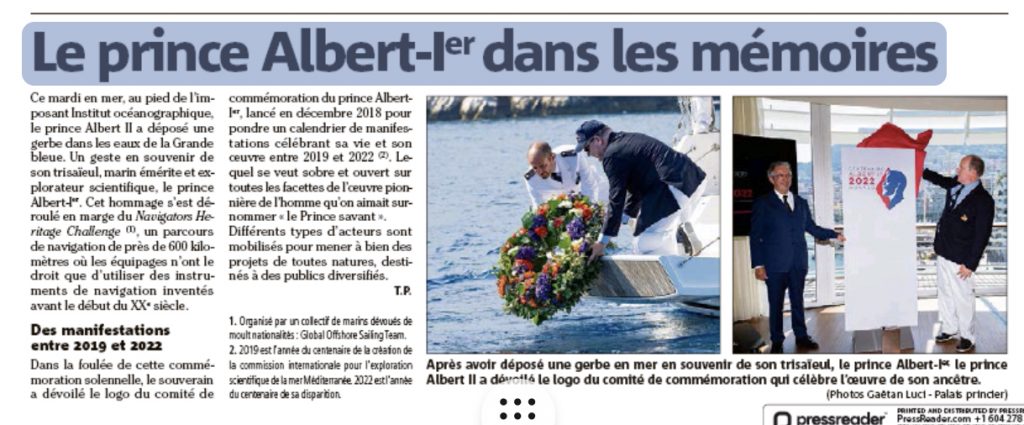
This Tuesday at sea, at the foot of the imposing Institute of Oceanography, Prince Albert II laid a wreath in the waters of the Great Blue. A gesture in memory of his great-great-grandfather, emeritus sailor and scientific explorer, Prince Albert I. This tribute took place on the fringes of the Navigators Heritage Challenge (1), a nearly 600-kilometre sailing course where crews are only allowed to use navigational instruments invented before the beginning of the 20th century; demonstrations between and following this solemn commemoration, the Sovereign unveiled the logo of the Prince Albert Ier Memorial Committee, launched in December 2018 to lay a calendar of events celebrating his life and work between 2019 and 2022 (2). It is intended to be sober and open to all aspects of the pioneering work of the man we liked to call “the learned Prince”. Different types of actors are mobilized to carry out projects of all kinds, aimed at diverse audiences, organized by a collective of dedicated sailors of many nationalities: Global Offshore Sailing Team. 2. 2019 is the year of the centenary of the creation of the International Commission for the Scientific Exploration of the Mediterranean Sea. 2022 is the year of the centenary of his death.
Translated with www.DeepL.com/Translator
Monaco-Matin – 5 Jul 2019 T.P.
Ce mardi en mer, au pied de l’imposant Institut océanographique, le prince Albert II a déposé une gerbe dans les eaux de la Grande bleue. Un geste en souvenir de son trisaïeul, marin émérite et explorateur scientifique, le prince Albert-Ier. Cet hommage s’est déroulé en marge du Navigators Heritage Challenge (1), un parcours de navigation de près de 600 kilomètres où les équipages n’ont le droit que d’utiliser des instruments de navigation inventés avant le début du XXe siècle.Des manifestations entre et Dans la foulée de cette commémoration solennelle, le souverain a dévoilé le logo du comité de commémoration du prince AlbertIer, lancé en décembre 2018 pour pondre un calendrier de manifestations célébrant sa vie et son oeuvre entre 2019 et 2022 (2). Lequel se veut sobre et ouvert sur toutes les facettes de l’oeuvre pionnière de l’homme qu’on aimait surnommer « le Prince savant ». Différents types d’acteurs sont mobilisés pour mener à bien des projets de toutes natures, destinés à des publics diversifiés.Organisé par un collectif de marins dévoués de moult nationalités : Global Offshore Sailing Team. 2. 2019 est l’année du centenaire de la création de la commission internationale pour l’exploration scientifique de la mer Méditerranée. 2022 est l’année du centenaire de sa disparition.
THE EVENT
The speaker this morning is Jochen Werne, a graduate banking and marketing specialist. As director and authorized signatory, he is responsible for private banking and corporate banking at Bankhaus August Lenz & Co. AG in Munich. He is guest lecturer at universities and colleges, keynote speaker at banking and innovation conferences, author and co-author of books and articles on leadership, innovation, KI, FinTechs, Cyber Security and much more. He is a member of the platform for artificial intelligence “Learning Systems” initiated by the Federal Ministry of Education and Research and advising the German Federal Government as well as of the Royal Institute of International Affairs Chatham House, ambassador of the Peter Tamm sen. foundation and is listed by Focus-Magazin as one of the AI experts in Germany. He is the founder of the Global Offshore Sailing Team GOST and co-founder of the NGO Mission4Peace, which is dedicated to historical research, building international diplomatic relations and promoting international dialogue.
The participants will also get to know the Diplomatic Council (DC) this morning. It combines a global think tank, a business network and a charity foundation in a unique organization with consultative status at the United Nations. Stephanie Stoerk, Chapter Director DC Stuttgart, explains what distinguishes the Diplomatic Council from all other networks and what advantages it offers its members.
Breakfast is open from 8:30 am. At 9:00 a.m. we start our official program (whoever comes earlier has time to eat in peace), which lasts until 10:30 a.m. (including questions and answers). In between there is always the possibility to eat from the rich breakfast buffet.
Translated with www.DeepL.com/Translator
PROGRAMM
Der Redner an diesem Morgen ist der diplomierte Banking- und Marketing-Spezialist Jochen Werne. Er verantwortet als Direktor und Prokurist das Private Banking sowie den Corporate Banking Bereich bei der Bankhaus August Lenz & Co. AG in München. Er ist Gastdozent an Universitäten und Hochschulen, Keynote Speaker auf Banking- und Innovationskonferenzen, sowie Autor und Co-Autor von Büchern und Artikeln zu Leadership, Innovation, KI, FinTechs, Cyber Security u. v. m. Er ist u. a. Mitglied der vom Bundesministerium für Bildung und Forschung initiierten und die deutsche Bundesregierung beratende Plattform für Künstliche Intelligenz „Lernende Systeme“ sowie des Royal Institute of International Affairs Chatham House, Botschafter der Peter Tamm sen. Stiftung und wird vom Focus-Magazin als einer der KI-Experten in Deutschland geführt. Er ist Gründer des Global Offshore Sailing Teams GOST und Co-Founder der NGO Mission4Peace, die sich der historischen Forschung, dem Aufbau internationaler, diplomatischer Beziehungen sowie der Förderung eines internationalen Dialogs widmet.
Darüber hinaus lernen die Teilnehmer an diesem Morgen das Diplomatic Council (DC) kennen. Es verknüpft einen globalen Think Tank, ein Business Network und eine Charity Foundation in einer einzigartigen Organisation mit Beraterstatus bei den Vereinten Nationen. Stephanie Stoerk, Chapter Director DC Stuttgart, informiert, was das Diplomatic Council von allen anderen Netzwerken unterscheidet und welche Vorteile sich daraus für die Mitglieder ergeben.
Jochen Werne, Director Marketing & Business Development at Bankhaus August Lenz, explains in his keynote address how we can shape the future from the innovations and topics of the past and why digitization must be thought of not only technologically but also culturally.
Jochen Werne, Direktor Marketing & Business Development beim Bankhaus August Lenz, erläutert in seiner Keynote, wie wir aus den Innovationen und Themen der Vergangenheit in der Gegenwart die Zukunft gestalten können und warum Digitalisierung nicht nur technologisch, sondern auch kulturell gedacht werden muss.
Author: Jochen Werne / first published May 2019 @LinkedInPulse
Siri or Alexa? Who can offer us more help in our daily life? Who provides the better answers and leads the more eloquent conversation? A legitimate question, because both Smart Devices are now so technically mature that it is difficult to make a simple distinction. Alexa was only launched in November 2014 in the USA and at the end of October 2016 in Germany.

Our world is changing from analogue to digital. While the invention of the printing press in 1450 by Gutenberg was a true milestone on the timeline of human development, we now live surrounded by smartphones and cloud applications in which we can store, share and retrieve even the most private information from anywhere in the world. Smart support is omnipresent: Siri accompanies us through everyday life in the form of Apple products and Alexa awaits us – Amazon powered – with a familiar voice when we get home. The intelligent speech assistance systems are only one of many modern applications of Machine & Deep Learning technologies and are therefore more broadly defined by artificial intelligence. With the extremely dynamic and rapid development of smart robotics and learning systems, some people are asking themselves what role humans will play on the stage of these technologies in the future.
The emerging technological possibilities, like all technological achievements in the past, have an impact on our daily personal lives, but their potential unfolds when we consider this impact in a scaled way and when it comes to our society as a whole. The Tübingen professor of media science, Bernhard Pörksen, even speaks of the fact that we have long since been able to be described as a “digital society” – this change took place in an extremely short time and without us being prepared for it. As a result, we would first have to learn competences to understand our actions in this new digital world and also to learn how to deal with the resulting effects. The learning of these skills takes place at different speeds in the case of digitisation issues, even against a demographic background. In contrast to the digital natives of the 21st century, some parts of our population with fewer points of contact with digital media find it more difficult to deal with the challenges of new technological standards and to adapt to the changed conditions in the service sector. The efficiency of the technical possibilities that permeate all areas of our lives is impressive, but it is crucial for success in the service sector not to ignore one factor: human empathy.
An example of this is the financial sector. Your own money is an issue that most people are most personally concerned about. However, plagued by fears of loss, personal biases and an extremely complex oversupply of investment alternatives, many investors seek personal support that goes beyond enumerating facts. We are talking about human support and empathic accompaniment, which machines (so far) have not been able to provide. A service that ideally covers not only the technical aspects of financial consulting, but also the behavioural finance aspects.
Undoubtedly there are already developments like Google Assist, in which attempts are made to incorporate empathic components into the developments, but the ability of the machines to simulate emotions and accordingly cause emotional reactions in humans (still) reaches its limits.
The upcoming technological developments will help us to solve many hitherto unsolvable problems in e.g. medicine, in environments hostile to humans or in a World Food Programme in a relatively short time. But as always with new technologies, it is also important to limit the abusive possibilities of use and to educate population that have little contact with modern instruments and technologies, because otherwise there is the danger of creating a feeling of inequality, which in turn can lead in extreme cases to a division of society. The desired progress would thus be reversed into its opposite: a step backwards based on a lack of communication at the micro and macro levels.
“It will certainly be our task in the future to ensure that developments in technological progress, artificial intelligence and the role of man go hand in hand. To advance optimizations through technology and digitization, as well as a parallel enlightenment of the individual with regard to his uniqueness in relation to technological development, as well as his social responsibility in this context.”
Jochen Werne
The following comparison should simplify the problem between strengths and limitations of automated systems: In 2012 an autopilot would probably not have let the Costa Concordia collide with a rock – the reason was human, emotionally driven behaviour. But an autopilot could not have landed an Airbus 320 on the Hudson River in 2009 either. This required human experience and spontaneous creativity. Something that our brain can do, but that still allows the technical possibilities of AI to reach hard limits for the foreseeable future.
It remains to be said that smart devices like Alexa and Siri provide valuable support and even provide entertainment with the increasingly mature question-and-answer game. We can ask the digital companions anything. We also get – within the scope of technical possibilities – a cheeky answer. But we have to deal with the extent to which these answers provide us with what we expect, also on an emotional basis. Because our expectations often go beyond a technical answer.

More in-depth insights on this topic can be found, for example, at the Platform for Learning Systems (https://www.plattform-lernende-systeme.de/home.html ).
“It has been an honour to give a speech for the “Marine-Offiziers-Messe München”, highlighting the importance of Antarctica for us and our planet and to report about the Global Offshore Sailing Team’s Expedition Antarctic Blanc.”
Jochen Werne
Antarctic Blanc Expedition Leader
Having experienced the sea by themselves the retired German Naval Officers enriched the discussion greatly with their own fascinating experiences and personal stories about life on sea and the challenges with the elements.
I’m grateful to Commander ret. Bernd Lehmann and Commander ret. Bernd Chittka for the invitation and the members and guests of the “Marine-Offiziers-Messe München for an outstanding evening and their engagement for our society.
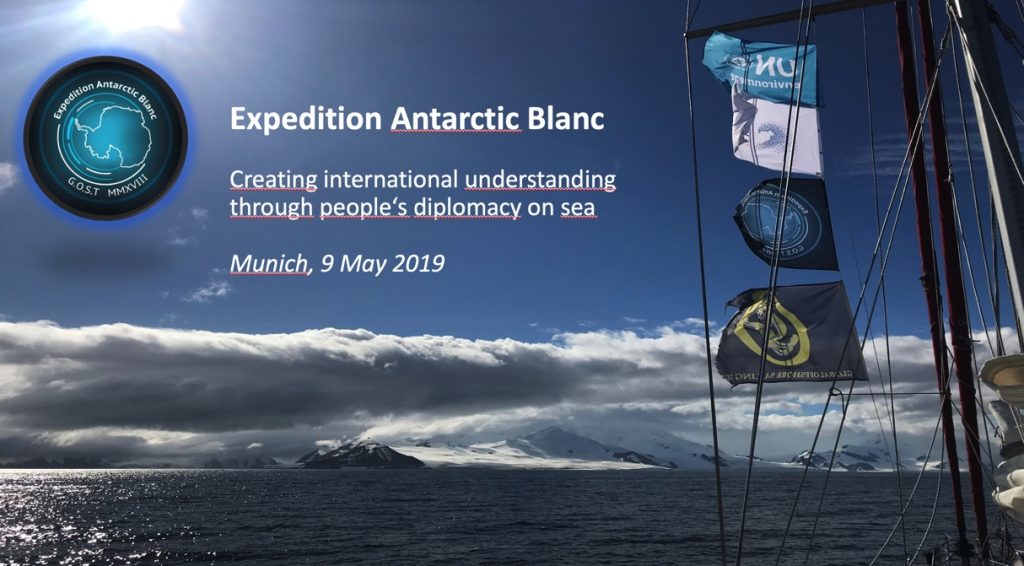
The Global Offshore Sailing Team sailed to the most Southerly partially ice-free place of this planet – the ANTARCTIC continent. The international team remembered all sailors who bravely explored this fragile and dangerous environment.
With this Expedition a platform of intercultural and interdisciplinary exchange for ANTARCTIC enthusiasts such as Historians, Environmental Scientists, Sailors, NGO’s, Navies, Associations or just out of personal interest has been created.
Artificial intelligence is finding its way into the highly regulated world of banking. And not only GAFA Silicon Valley high-tech companies see it as the technology of the future, but also FinTechs and established banks. How it came to this, what possibilities and limits there are at the moment and why humans will remain irreplaceable not only when it comes to money – the commentary
by Jochen Werne, innovation and transformation expert
Munich private bank Bankhaus August Lenz
Original published in German in the IT-Finanzmagazin (31 July 2018). Translation by DeepL
After “FinTech”, “Blockchain” and “Crypto”, “AI” is the new buzzword in the banking world. Whether chatbots in the digital customer center or self-learning algorithms for highly complex investment strategies are being discussed – the omnipresence of the term suggests that the integration of artificial intelligence into one’s own business model seems to be virtually vital.
Artificial intelligence and big data are currently the strongest and most vibrant innovation trends in the financial sector …
… was also one of the guiding principles of Prof. Joachim Wuermeling, board member of the Deutsche Bundesbank, in his speech on “Artificial Intelligence” at the second annual FinTech and Digital Innovation Conference in February 2018 in Brussels.
The choice of the conference venue, which like rarely any other city combines both a belief in progress and a deeply rooted European tradition, can hardly be more symbolic of the forthcoming change. In fact, the topic is by no means new: the development towards an increased use of so-called non-human intelligence is based on approaches from the 1940s – with the invention of the first computers
Artificial intelligence: revolution as a reaction to mountains of data?
But what is now possible in times of exponential technologies is in fact nothing less than a revolution. The financial industry is sitting on a valuable mountain of data, the extent of which is currently difficult to estimate. The maturing AI systems would not only make the preparation and processing of this data easier, but also much more cost-effective, faster and more targeted. Data already collected could become the most valuable raw material and a resource due to the technological leaps in the field of AI, which, in combination with the enrichment of external, non-structured data, must be “usable” in a meaningful way.
The industry is asked to use private data in a sensitive way for the benefit of the customer, – a goal that should certainly apply to all AI-based approaches.
To find meaningful regulations for the handling and the effects of the use of AI on society, economy and thus on our life and the work of tomorrow is the task of politics. The fact that this topic is taken very seriously is evident not only in national initiatives such as the German Platform for Artificial Intelligence “Learning Systems”, but also in the European Artifical Intelligence shoulder-to-shoulder approach, which is being pushed forward by France and Germany.
“Digital hand holding” in the event of a financial crash is not enough
At present, it is still too early to say which operational areas of the financial world will sooner or later be supported – in part or even entirely – by the use of AI systems. However, the financial crises of the past have shown this time and again:
Trust is crucial when it comes to money. Trust in the markets, the banking system and the human contact as an intermediary in a complex issue”.
However, the banking industry knows very well from its own experience how easy it is to loose customer’s trust. An experience that Mark Zuckerberg and Facebook recently also had to make in connection with the Cambridge-Analytica scandal. As with every new technology and every new approach, the same applies to the topic of “intelligent” systems: a lot of trust, coupled with half-knowledge and a big dash of emotionality results in a popular trend cocktail, which, however, bears a certain risk of headaches on the following day.
Jochen Werne is the authorized signatory responsible for Marketing, Business Development, Product Management, Treasury and Payment Services at Bankhaus August Lenz & Co. After two years as navigator of the sailing training ship ‘Gorch Fock’, the international marketing and banking specialist completed his studies as client coverage analyst at Bankers Trust Alex. Brown International and in Global Investment Banking at Deutsche Bank AG, he has worked on numerous projects in other European and American countries. In 2001, he joined Accenture as a Customer Relationship Management Expert in the Financial Services Division before joining Bankhaus August Lenz & Co. AG in Munich, where he has since been responsible for various areas of the institute. As part of the Innovation Leadership Team of the Mediolanum Banking Group, a member of the expert council of Management Circle and the IBM Banking Innovation Council, Jochen Werne is a keynote speaker at numerous banking and innovation conferences.
On Feb 12, 1942, the Channel Dash happened. 70 years later, on Feb 12, 2012, the Global Offshore Sailing Team has been invited for the first time by the Channel Dash Association to commemorate brave air and sea man and to create and strengthen friendships between people and nations who were enemies in former times. Today at the 76th anniversary of the Channel Dash we continue the tradition to remember and to make us all aware how precious and equally vulnerable peace is. And therefore how important the engagement of our civil society is to strengthen the roots of peace every day.
12 February 2012: Jochen Werne, Skipper and Representative of the GLOBAL OFFSHORE SAILING TEAM (www.gost.org) is commenting the “Channel Dash” during the CHANNEL DASH ASSOCIATION’s 70th Anniversary Remembrance Event at the Royal Airforce Base Manston. The Team thanks greatly the CDA (www.channeldash.org) for the kind invitation and hospitality. The Channel Dash, (codenamed Operation “Cerberus” by the Germans), was a major naval engagement during World War II in which a German Kriegsmarine squadron consisting of both Scharnhorst class battleships, and heavy cruiser Prinz Eugen along with escorts, ran a British blockade and successfully sailed from Brest in Brittany to their home bases in Germany via the English Channel.* The Expedition Corps of the Global Offshore Sailing Team will leave – 70 years after Operation “Cerberus”– Brest on a 50ft sailing yacht on the historical footsteps of this spectacular operation. This historic research Expedition “CERBERUS” 2012 wants to be a platform for remembering and honoring all woman and men who fought on both sides with great bravery. The Daily Mail reported in 1942 “This is an episode of which Britons can be rightly proud. In planes which, against the German protecting aircraft, were as slow as a cart horse compared with a motorcar, 18 men of the Fleet Air Arm flew over the Channel. Crippled and ablaze before they got within range, they kept on, delivered their attacks – and died!” *www.wikipedia.de
We also want to remember the man who inspired us so much bringing our goal of creating international understanding forward: Peter Nixon
Peter Nixon, Chairman of the Channel Dash Association once reflected about history and human mankind with the following words:
„ … working so hard to bring history back to everyone`s attention and recognizing the many great acts of courage performed on our behalf by men and women of all sides during a period of conflict. … It is not about Winner`s or Loser`s. … The world is a wonderful place to live because it is made up of many different, but beautiful countries.… We should be proud of this fact. Equally, we should not be ashamed of our past, nor should we glorify it, for it was our past which created what we are today.”
Peter Nixon
The world lost in July 2018 an outstanding personality and many of us a dear friend. His ideas and inspiration will remain with us. Jochen Werne Co-Founder – GOST